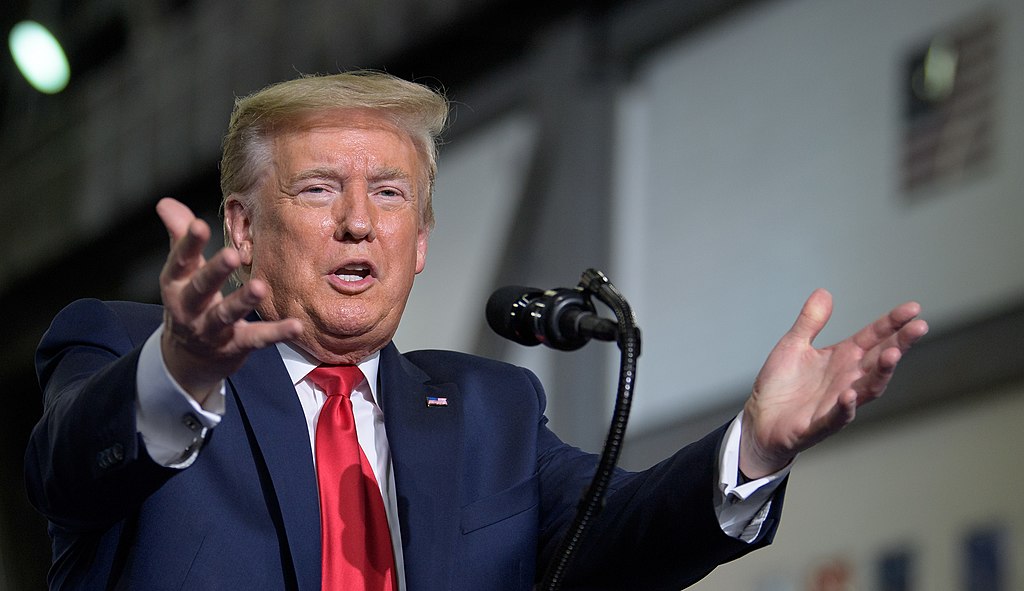In a sane news cycle — and I am using the word “sane” very deliberately here — the president of the United States using the words, “I wish her well” to describe how he feels about an alleged sex trafficker, rapist, and accomplice to Jeffrey Epstein would be a huge scandal. As it stands, it’s just another week in Donald Trump’s America.
Having said that, this bizarre statement is just another reason why everyone should be paying close attention to Trump’s mental health.
There is a lot of opposition to the idea that a leader’s obvious malignant narcissism and possible, vehemently denied dementia should be a fair topic of debate. We’re told that by directly addressing this topic, we are only demonizing good people with serious mental health struggles and further stigmatizing the very topic of mental illness. We’re told that the real issue with Trump is that he is a bad leader, and that the subject of him being mentally fit, or unfit, to lead this country is purely between him and his doctors.
I find these arguments to be in the same vein as the arguments that people make when they insist that the word “crazy” should not be used as a pejorative, and that the word “sane” should not be used as a compliment — ultimately lacking in nuance.
I’m saying this as someone who has definitely been demonized for speaking candidly about the subject of mental health, including by those close to me, including people I have worked with. By being open about what it’s like to deal with post-traumatic stress disorder, including on social media and in this very column, I have made myself vulnerable to those that would argue that I am unprofessional and unreliable. I’ve even been told that people should not want to associate with me — purely because I am a professional woman who is honest about things in general, this uncomfortable topic in particular, in her writing.
Stigma has affected my career and the opportunities that are open to me. It doesn’t matter if I perform my duties correctly — what matters is the miasma, the fear that the very definition of illness engenders. It doesn’t even matter that I have written, openly, honestly, and with a great amount of hope, about treatment, medication, staying focused and committed to my own well-being, and being a productive member of society.
Stigma is real. I live it every day. You know what else is real, however? The fact that mental illnesses affect different people differently. Moreso, a very powerful person in the grip of a mental illness can do real damage. As my old friend and former colleague Anna Lind-Guzik argued in the first year of Trump’s disastrous presidency — “how can Trump’s illness be irrelevant when his delusions are shaping our reality?”
Three years on, the president’s delusions have resulted in a disastrous non-response to a pandemic that has killed over a hundred thousand Americans — and it is not done yet. The president stands up and tells us that the virus will simply “disappear,” because that is his delusion, and while all pandemics end eventually, the cost of this one has already been astronomic. How much more will we have to bear? All because a single man is both unable and unwilling to confront reality?
The very power of the office that Trump occupies demands that we ask hard questions about his mental state. No, he is not the same as my paternal grandmother, whom I watched succumb to dementia with great sorrow — because my grandma didn’t have the nuclear codes. This is precisely why the debate on mental illness, how to approach it and how to respond to it, should never be a zero-sum game.
I understand the desire to take a hard stance on discrimination against people with mental illnesses — in fact I take that stance myself, every damn day, and especially when I am writing this column. You’re not discriminating against the leader of this country if you point out that he is clearly unfit, however. Discrimination implies a power imbalance, and believe me, the power is not on your side when you make such a case — it is on his. In fact, he is so powerful that he is already casually entertaining the possibility that he will simply not accept the election results should he lose, setting us up for an even greater disaster than we’ve dealt with already.
No, telling the truth about Trump does not mean that we have to reject or ostracize or otherwise abuse people with mental illnesses as a whole. Let’s be adults here. We can’t adequately prepare for what comes next if we refuse to admit that the president is not in touch with reality, nor does he care to be. The president does not care about the people who are dying, because he is unable to care. The president expresses sympathy for a woman who preyed on children, because he either does not know or care as to what he is talking about. Is he a bad leader? Absolutely. And his poor qualities are made that much worse by the fact that he is a narcissist in obvious mental decline.
Tiptoeing around the elephant in the room will only ensure that we all get stomped by it eventually.
Image credit: NASA/Bill Ingalls

